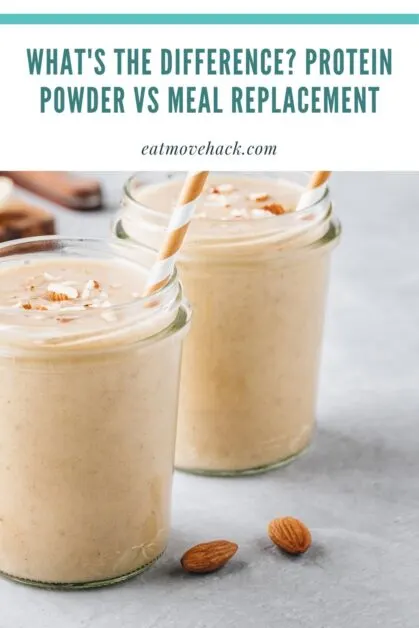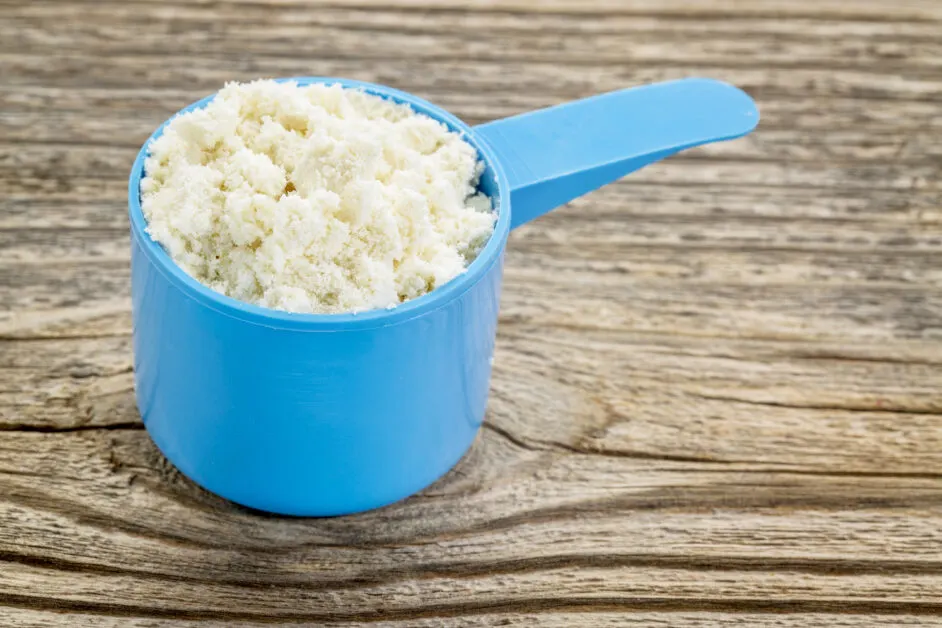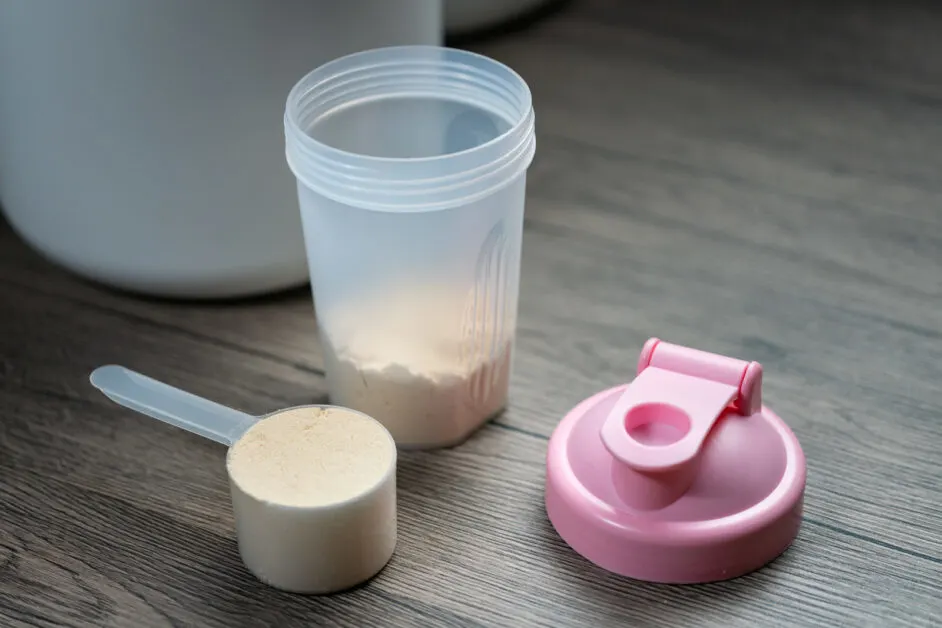Some of the links in this post are affiliate links. This means if you click on the link and purchase the item, we will receive an affiliate commission from the vendor at no extra cost to you. These business relationships allow us to keep bringing you great EatMoveHack content. All opinions remain our own.
As you navigate the world of powders and shakes, you might find yourself wondering which is better: protein powder vs meal replacement. Seeing as many product labels can be confusing or even misleading, it’s a good idea to learn more about for what purpose each of these is designed so you can choose the right one for your specific goals.
Can protein powder be used as a meal replacement? Will meal replacements cause you to gain weight? Which is best for building muscle? Learn the answers to these questions and more as we explore the differences between protein powder vs meal replacement.

Tackling Meal Replacement Shakes vs Protein Shakes
Before diving into the differences between protein powder vs meal replacements, let’s take some time to understand exactly what each is.
What are Protein Powders and Shakes?

Just as their names suggest, protein powders and shakes are chock full of protein. The protein usually comes from plant-based foods like brown rice, hemp, peas, and soy or by way of whey, a component of milk.
Protein is a macronutrient that everybody needs, but it plays a particularly important role in the formation of muscle. For this reason, protein supplements are popular among bodybuilders and others who regularly work out to bulk up, slim down, or otherwise work on their body composition.
Because protein powders and shakes are supplements, they’re not intended to replace a meal. Instead, you take protein supplements alongside your regular diet.
Protein powders arrive dry in packets or tubs. You mix them with water, milk, milk substitutes, or juice to create a shake. Protein shakes come in bottles and are pre-mixed, so they’re ready to go.
Protein powders and shakes are typically low in calories because they don’t contain much of other macronutrients, such as carbohydrates and fat, and most people consume them just before or right after working out to aid with recovery and the building of muscle.
What are Meal Replacements?

Unlike protein powders and shakes, meal replacements are intended to replace a meal. They come in both powder and premixed liquid form, and because you’re supposed to use them as a substitute for one of your regular meals, meal replacements also offer a balanced blend of essential nutrients and vitamins.
Meal replacement shakes have more calories than protein supplements, but they typically contain fewer calories than a typical meal. When you integrate them into your diet, they’re designed to help you comfortably and safely lose weight by reducing the overall number of calories you consume each day.
In addition to helping you control your caloric intake, meal replacement shakes are super convenient. They’re premixed so you can grab them and go, and you can consume them in just a couple of minutes, no matter where you are. If you lead a busy lifestyle and don’t have the time to sit down for proper meals, meal replacement shakes can help ensure you get the fuel and nutrients you need to get through the day and stay healthy.
Protein Powder vs. Meal Replacement
Let’s quickly recap protein powder vs meal replacements:
Protein Powders and Shakes
- Contain elevated levels of protein derived from dairy or plants
- Support the formation of muscle, especially after working out
- Lack of carbs and fat means lower calories, generally around 200 calories per serving
- Available in powder form or premixed liquid shakes
When to Use Protein Shakes
Turn to protein powders and shakes when you need fuel to get through a workout or extra protein to help build muscle. Protein shakes offer the greatest benefit when you consume them right before working out (for fuel) or right after you’re done (to repair, build, and maintain muscle).
Meal Replacements
- Contain a balanced blend of macronutrients and vitamins, just like a healthy meal
- Designed to replace one or more of your regular daily meals to support weight loss
- More calories than protein supplements, but fewer than typical meals
- Available in powder form or premixed liquid shakes
When to Use Meal Replacements
Reach for a meal replacement when you’re looking for a convenient and safe way to lose weight. Because meal replacements contain fewer calories than your typical meal but are packed with the proper ratio of macronutrients, they help you reduce your overall calorie intake in a healthy way so you’ll drop pounds.
FAQs
Meal replacement vs protein shake — which should I use?
When weighing meal replacement shakes vs protein shakes, you really need to consider what you’re trying to achieve.
If you’re looking for quick fuel before a workout or to build muscle, a protein shake is the best bet.
If you’re looking to lose weight, a meal replacement is a better choice because it has a more complete blend of nutrients.
Can a protein shake replace a meal?
Protein shakes are not usually designed to replace a meal, but you can definitely use them for this purpose, so long as you track your overall macronutrients each day to be sure you’re consuming a balanced diet.
Are meal replacements high in calories?
No, most meal replacements are not high in calories. They actually have fewer calories because they’re designed to help you lose weight.
However, because each meal replacement is different, you need to check nutrition labels to see how many calories you’re consuming. Most meal replacement shakes contain 200 to 400 calories, but there may be unhealthier options that contain excess sugar, fat, and calories.
Are protein shakes vegan?
Protein supplements made from plant-based foods can be vegan, depending on the other ingredients in the powder or shake.
Most vegan protein shakes will be clearly labeled as such. If you come across a plant-based protein powder or shake that isn’t, carefully review the ingredients list to determine whether any animal-based products (like dairy) have been added.
Can I have more than one meal replacement per day?
Because meal replacements contain the same balance of macronutrients and vitamins that you’d find in a healthy meal, they are safe to use more than once a day.
However, note that meal replacements contain fewer calories than your typical meal. While it is necessary for you to reduce your caloric intake to lose weight, consuming too few calories is not safe nor healthy. If using more than one meal replacement shake per take will take you far under your daily caloric goal, consider sticking with just the one.
Wrapping Up
The biggest difference between protein powders vs meal replacements is that the former is a supplement (made to integrate with your existing diet), while the latter is a meal substitution (meant to be consumed in place of a regular meal).
This is an important distinction because supplements and meal replacements serve different purposes. You generally take protein supplements to give you an added boost of a nutrient that’s essential for building muscle. On the other hand, meal replacements are more nutritionally complete to keep you healthy when you use them in place of your regular breakfast, lunch, and/or dinner.
Confused about proteins, carbs, and fat? Check out our complete guide to body composition to learn more about how each of these macronutrients affects your overall health and well-being.

